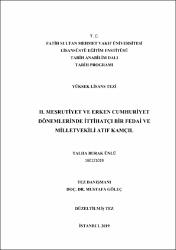II. Meşrutiyet ve Erken Cumhuriyet Dönemlerinde İttihatçı Bir Fedai ve Milletvekili Atıf Kamçıl
Künye
ÜNLÜ, Talha Burak, II. Meşrutiyet ve Erken Cumhuriyet Dönemlerinde İttihatçı Bir Fedai ve Milletvekili Atıf Kamçıl, Fatih Sultan Mehmet Vakıf Üniversitesi Lisansüstü Eğitim Enstitüsü Tarih Anabilim Dalı, Yayımlanmamış Yüksek Lisans Tezi, İstanbul 2019.Özet
Atıf Bey, 1880/82 senesinde Çanakkale’de doğmuş, 1904’te Harbiye Mektebi’nden Piyade Mülazımı rütbesiyle mezun olarak Manastır’daki III. Ordu’ya atanmıştır.
II. Meşrutiyet’in ilanından yaklaşık bir sene önce İttihat ve Terakki Cemiyeti’ne katılan Atıf Bey, cemiyetin Fedâi Zâbitan şubesine üye olmuştur. II. Abdülhamid’e isyan ederek dağa çıkan Resneli Niyazi Bey’in ayaklanmasını bastırmak için sultan tarafından görevlendirilen Şemsi Paşa’yı öldürmüş, Meşrutiyet’in yeniden ilan edilmesinde büyük bir rol oynamıştır.
II. Meşrutiyet’in ilanından kısa bir süre sonra Dersaadet Jandarma Alayı Göztepe Bölüğü’nde görev yapan Atıf Bey, Meclis-i Mebusan’da iki dönem Çanakkale, bir dönem de Ankara mebusu olarak vazife yürütmüştür. İTC’nin Merkez-i Umumisi’nde ve Teşkilat-ı Mahsusa’da önemli görevler yürüten Atıf Bey, önce Divan-ı Harb-i Örfi’de yargılanmış ardından da İngilizler tarafından Malta’ya sürgüne gönderilmiştir. Sürgünden sonra bir süre jandarma zabitliği ve Çankırı Reji Müdürlüğü’nde çalışan Atıf Bey, Cumhuriyet’in ilanından sonra İnhisarlar Müdürlüğü’nde çeşitli görevler üstlenmiştir.
1939-1943 ve 1943-1946 yılları arasında T.B.M.M.’de iki dönem Çanakkale Milletvekilliği yapan Atıf Bey, hayatının son döneminde Sular İdaresi’nde çalışmış, 21 Ocak 1947 tarihinde, Kadıköy’de vefat etmiştir.
Bu tezde, yaşadığı dönemin olayları ışığında bir Atıf Kamçıl biyografisi ortaya konulmuştur. Atıf Bey’in siyasi ve askeri faaliyetleri incelenmiş veyakın tarihimizdeki yeri analiz edilmeye çalışılmıştır. Atıf Kamçıl was born in Çanakkale in 1880/82. He grauated from Military School (Harbiye Mektebi) with the rank of Infantry Lieutenant in 1904 and was appointed to the 3rd Army in the Monastery.
Mr. Kamçıl, who joined the Committee of Union and Progress (CUP) about a year before the declaration of The Seccond Constitutional Monarchy, became a member of the self-sacrificing officers (Fedâi Zâbitan) branch of the committee. He killed Şemsi Pasha who was appointed by the sultan to suppress the rebellion of Resneli Niyazi Bey against Abdülhamid II and played a major role in the re-proclamation of the Constitutional Monarchy.
After the declaration of the Second Constitutional Monarchy, he officiated in Göztepe Company of Dersaadet Gendarmerie Regiment and he served as the deputy of Çanakkale for two terms and as the deputy of Ankara for a term in the Chamber of Deputies of the Ottoman Empire (Meclis-i Mebusan). Atıf Kamçıl, who carried out important tasks in the Center of the CUP and Teşkilat-ı Mahsusa, was first tried in the Martial Court (Divan-ı Harb-i Örfi) and then exiled to Malta by the British. After the deportation, he worked as a gendarmerie officer and in Çankırı Reji Müdürlüğü for a while. After the proclamation of the Republic, he undertook various duties in the Directorate of İnhisarlar.
Between the years of 1939-1943 and 1943-1946, he served as a deputy of Çanakkale for two terms in Grand National Assembly of Turkey (T.B.M.M.). In the last period of his life, he served in the Water Administration and passed away on 21 January 1947 in Kadıköy.In this thesis, an Atıf Kamçıl biography was studied in the light of the events of the period he lived. Atıf Kamçıl’s political and military activities were examined and his place in our recent history was tried to be analyzed.



















